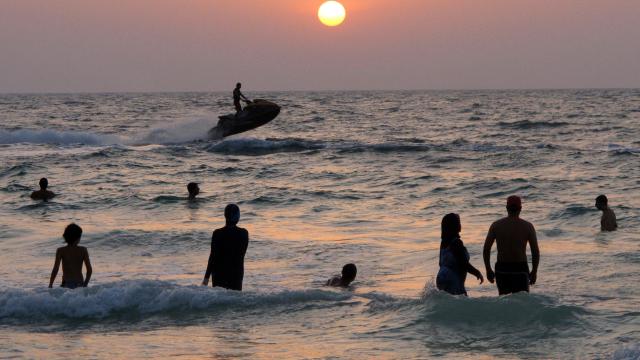If sharks and sunburns don’t scare you at the beach, perhaps this will: According to preliminary research out this week, it only takes a 10-minute swim in the ocean to get your skin covered in a fresh coat of bacteria. While that’s not necessarily bad, some of these bacteria could be disease-causing or raise your risk of infection by disrupting your skin’s delicate microbial environment, known as the microbiome.
For their quirky study, researchers at the University of California, Irvine went to the beach and recruited a select set of beachgoers. They were people who only swam in the ocean infrequently and who weren’t using sunscreen at the moment. They also had to not have bathed in the past 12 hours, or used antibiotics in the past six months. Before swimming, the nine volunteers who were ultimately recruited had a skin swap taken from the back of their calf, then went on a 10-minute swim. After they returned and completely dried off, the skin was swabbed again, as well as six hours and a day later.
Before the swim, they found, the microbiome of each volunteer was easily distinguishable. But immediately afterward, their microbiomes changed and became much more similar to one another.
“Our data demonstrate for the first time that ocean water exposure can alter the diversity and composition of the human skin microbiome,” said lead author Marisa Chattman Nielsen, a PhD student at the University of California, Irvine, in a release from the university. “While swimming normal resident bacteria were washed off while ocean bacteria were deposited onto the skin.”
The changes to the microbiome were temporary, with most well on their way to baseline by 24 hours time. But there were some worrying findings. On each person, they detected common sea-dwelling bacteria called Vibrio. Most species of Vibrio are essentially harmless, but some are responsible for diseases like cholera, or can rarely cause flesh-eating skin infections, especially in people with weakened immune systems. The team’s methods could only ID the presence of Vibrio bacteria, not their specific species. But they seemed to be drawn to people’s skin, since a greater proportion of Vibrio bacteria was found on the volunteers’ skin than in the surrounding ocean water the team also tested.
“While many Vibrio are not pathogenic, the fact that we recovered them on the skin after swimming demonstrates that pathogenic Vibrio species could potentially persist on the skin after swimming,” said Nielsen.
The results, it should be noted, are a work in progress; they’re being presented at the American Society for Microbiology’s annual conference this week. But presuming it holds up, the study could help explain a well-supported pattern—beachgoers who swim in the ocean are more likely to get sick with stomach aches or ear infections soon after than those who stay on the sand. And though the bulk of the blame can be tossed on the germs (often from poop) that get into our bodies, the team suspects that ocean bacteria as a whole can make illness more likely through their effects on the skin microbiome.
“Recent studies have shown that human skin microbiome plays an important role in immune system function, localised and systemic diseases, and infection,” said Nielsen. “A healthy microbiome protects the host from colonization and infection by opportunistic and pathogenic microbes.”
So be sure to shower after swimming in the ocean, and try not to get any seawater in your mouth.
